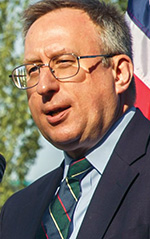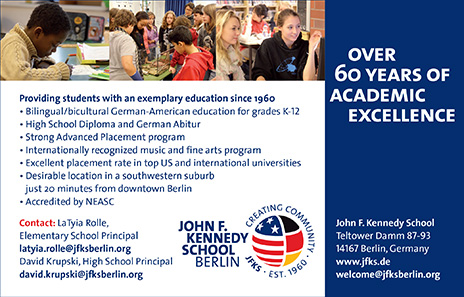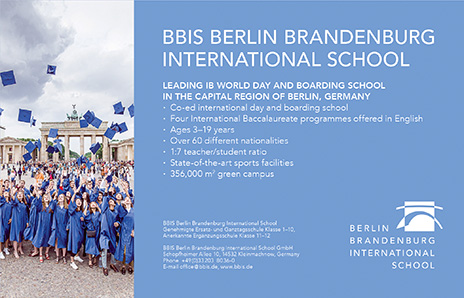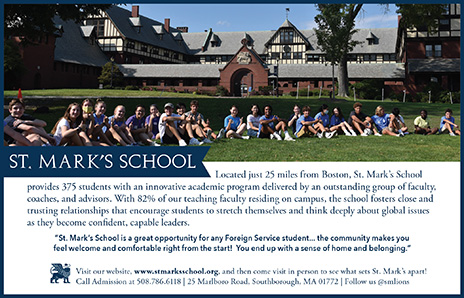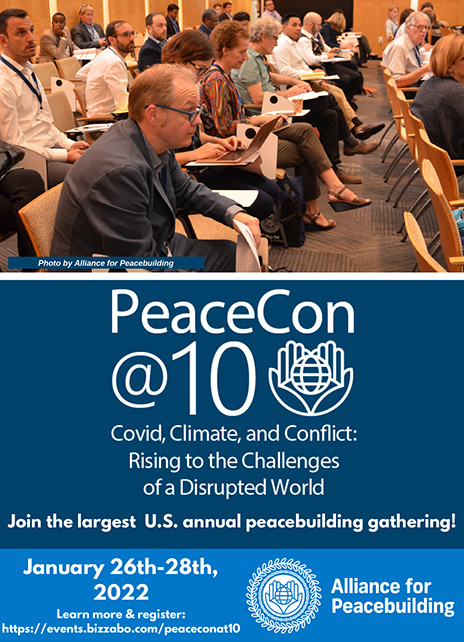Practical Lessons for Today’s Foreign Service
U.S. diplomats in the former USSR had a unique opportunity to better comprehend the world and practice their craft.
BY GEORGE KROL
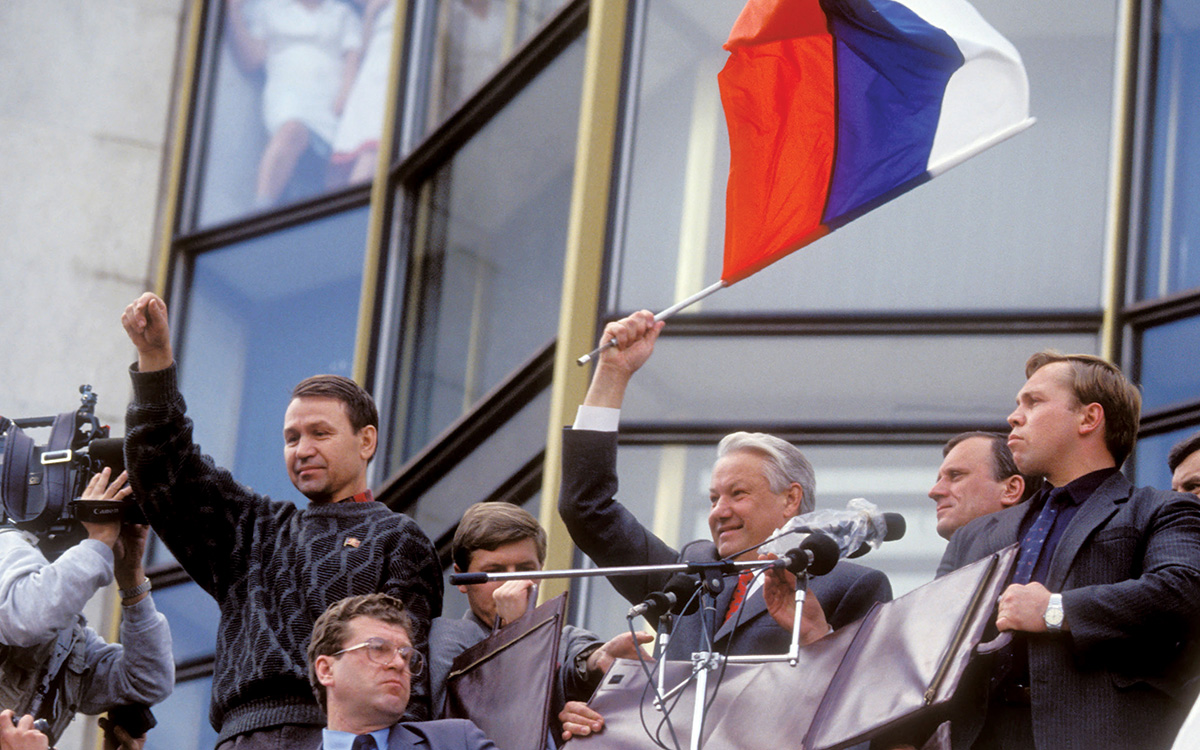
President of Russia Boris Yeltsin (holding flag) and his supporters in front of the Russian Parliament (the “White House”) in Moscow in the aftermath of the August 1991 coup attempt.
Alamy
Thirty years ago this month, the Union of Soviet Socialist Republics ceased to exist. At the time, I was a relatively junior diplomat, on my third overseas tour, assigned to the American consulate general in what was then called Leningrad. Little did I—or anyone else—know that the assignment would end two years later in the renamed city of St. Petersburg, in a world transformed by the collapse of the Soviet Union.
I spent most of 1991 traveling to Vilnius, Riga and Tallinn to report on the historic efforts of the Baltic republics to reassert their independence from the Soviet system. In July a Latvian parliamentary contact, Mavriks Vulfsons, asked me to be in Riga on Aug. 19 because he had heard “something big would happen that day.” Driving to Riga in my trusty Chevy Nova on Aug. 18, I woke up the next morning in a city under siege. Armed Soviet security forces stood outside my hotel opposite the Ministry of Internal Affairs building and had occupied key roads and bridges. I turned on the radio and TV and heard Soviet media reporting that Gorbachev had been “taken ill,” signaling the start of the attempted coup by Communist Party hardliners that most expected would trigger a crackdown in the upstart Baltic republics.
I quickly left the hotel, skirting the armed troops, and made my way to the Latvian Foreign Ministry, which was nearly deserted. I found Foreign Minister Janis Jurkans sitting alone in his office, smoking his pipe and considering his options, including a possible dash to Sweden. From his office, I was able to contact the State Department Operations Center to convey Jurkans’ message to Secretary Baker: There’s a coup underway in Moscow that may crush Latvia’s quest for independence; please do whatever you can to stop it.
Leaving Jurkans, I walked to the offices of the Latvian Cabinet of Ministers, where I found Prime Minister Ivars Godmanis on the phone with his Estonian counterpart, Edgar Savisaar. As Godmanis motioned me into his office, I could hear Savisaar’s loud voice: Soviet tanks are on their way to Tallinn. As they hung up, a Soviet military helicopter flew low over the nearby statue of Lenin and drew level with the prime minister’s office. I suggested we should get away from the windows.
I felt firsthand the reality of the collapse of the Soviet system for Russians at all levels. For a few, it was exhilarating. For many more, it was a nightmare of uncertainty and instability.
After a hasty chat with Godmanis, I walked across town to the Latvian parliament building, arriving just in time to witness the deputies rapidly pass a resolution declaring Latvia’s full independence before they hastily fled the building. Outside, I encountered Deputy Chairman of the Parliament Andrejs Krastins urging a gaggle of people outside the barricade to go home and take cover. Seeing a line of armored personnel carriers advancing, firing shots in the air, I suggested we return to the parliament building.
Inside, a strange scene appeared. A large buffet was laid out, perhaps intended to celebrate Latvia’s renewed freedom. Most of the deputies had fled, but not the parliament’s senior leaders and the stalwart cafeteria workers, who were all women. As Prime Minister Godmanis joined the group, Parliament Chairman Anatoliy Gorbunovs, reflecting the dark humor I frequently encountered in the Baltics, urged all present: “Eat while we are still free; it might be our last good meal!” After we toasted Latvia’s independence, however short-lived that might be, we waited for the bang on the door from Soviet security forces. My hosts thanked me for being there with them. At that moment, I realized what it meant to truly represent my country: To them, I was not George Krol, a young American diplomat from New Jersey, I was America; and America was standing with them in their darkest hour.
I share these vignettes not to chronicle my exploits as a Foreign Service officer during that historic time (those stories are being collected through the dedicated efforts of the Association for Diplomatic Studies and Training’s oral history program). Rather, I use them to highlight some of the lessons I learned as an FSO, not only in the Baltics but also in Russia and elsewhere in the former USSR, where I served almost continuously for the rest of my career. These experiences not only helped me become a better diplomat; they helped me comprehend today’s Russia and the other states that emerged from the Soviet Union.
Lesson One: Use the Language.
First and foremost, I cannot overemphasize the importance of learning and using the language. My only Russian language training had been a year at the Foreign Service Institute before arriving in Leningrad. It was clearly inadequate at first, but certainly provided a firm base on which to expand. The sheer number of conversations and interactions with Russian speakers initially overwhelmed me, but over time greatly improved my grasp and fluency in the language. Most importantly, I lost the fear of speaking Russian and learned how to communicate and, even better, how to listen. Using the language is not only vital for a diplomat to comprehend people and culture but also affords access and insight—and it can, and should, be fun.
Lesson Two: Adapt. Adjust. Be Flexible. Be Creative.
Prior to my arrival in Leningrad, reforms in the USSR under Gorbachev had already caused a sea change in our consulate’s work. The years of being confined to a 20-mile radius of the city—of reporting from Soviet newspapers and conversations with other diplomats and a few harassed dissidents—had ended. While we still had to file notes with the local Ministry of Foreign Affairs office if we wanted to travel beyond that perimeter, the MFA rarely denied travel. Although my predecessor Doug Wake and our deputy principal officer Jon Purnell had been ejected from the Baltics in March 1990 after Lithuania had declared its full independence, when I sought to venture back into the region in the late summer of that same year, along with our previously expelled DPO, the Soviet MFA did not object and never subsequently denied or even harassed any U.S. diplomat traveling to the Baltics. As events heated up in the Baltics throughout 1991, I traveled there practically weekly, and mostly alone, without incident.
At the consulate, we had no local hires aside from some contract Americans and a few Finnish nationals. We had to do most of the administrative work ourselves, which included making travel arrangements. Under these circumstances we became largely self-reliant and independent of Embassy Moscow. Despite embassy security regulations that would have required us to travel in pairs—and if by train, in a compartment by ourselves—we regularly ignored those rules (with our local security officer’s tacit approval). Moreover, the train conductors would often put people into the empty berths in our compartments to earn a little extra money for themselves. Frankly, those compartment companions were a fount of knowledge and insight for our cables. We in the “grad” (Leningrad) were glad the “embassy tsar” was far away, and that we had a benevolent consul general, Dick Miles, who let us do our job and kept Embassy Moscow at bay. As a former Marine, Miles instinctively understood and supported the expeditionary nature of our work, recognizing that creativity and a certain amount of guile were required to get the job done.
Lesson Three: Go Out and Discover.
The collapse of the August 1991 coup and subsequent independence of the Baltic states freed me from the Baltic beat and enabled me to concentrate on covering developments in Leningrad (the name change came in September) and the huge territory of northwest Russia. I was able to travel throughout the region meeting people who had rarely seen an American. I quickly realized that not all Russians are alike, and those who live away from the big cities of St. Petersburg and Moscow have their own distinct cultures and languages.
Our diplomatic tasks had also changed with the collapse of the USSR. No longer were we focused primarily on reporting on conditions in our district. Suddenly we became program officers for U.S. aid and assistance programs for which we had no prior experience, such as providing humanitarian aid to hospitals, orphanages and old age homes. We now saw sides of Russian life that Soviet authorities had long shut off from foreign purview. Most of our contacts in the Russian provinces spoke no English, and their Russian was of a type we Russian-language neophytes had never encountered. The experience was overwhelming for them and for us. But ironically, it allowed us to develop a deeper bond and, if we allowed ourselves, an emotional connection with the people.
I felt firsthand the reality of the collapse of the Soviet system for Russians at all levels. For a few, it was exhilarating. For many more, it was a nightmare of uncertainty and instability. I and many Russians knew precisely what Vladimir Putin meant when he called the end of the USSR a tragedy. But we also knew the USSR was now in the past—a defective system led by defective leaders that had failed. My contacts, like most Russians, did not wallow in self-pity or remorse. They showed remarkable strength and fortitude to pick up the pieces, adapt and live their changed lives with the same sardonic humor that is quintessentially Russian. As a diplomat, I tried to convey this picture back to Washington, but I fear many there had a different picture drawn for them by others who lacked the insight and did not share the empathy afforded us in the field. It was then—and I would contend, remains—an unfortunate dilemma and flaw in the American foreign policy establishment.
We also had to deal with a deluge of official and unofficial visitors, who often knew little about Russia and had even less experience working with Russians. Many visitors were well intentioned, while others sought advantages for themselves, like vultures circling a corpse. We from the consulate often had to sort out misunderstandings between locals and visiting Americans. Both sides could be equally uncomprehending and at times overbearing. It was Diplomacy 101 at its best, but FSI never trained us for this. We learned on the fly, and what helped most was empathy: putting yourself in the other guy’s shoes.
I frequently encountered visitors and even colleagues who clung to preconceived notions about Russia and the other former republics, and I am sorry to say that arrogance often accompanied our assistance. I vividly recall the restrained ire in Vladimir Putin’s eyes when, as St. Petersburg’s de facto “foreign minister,” he had to listen to yet another American official or businessperson lecture him at length on the merits of American-style democracy, market economics and practically everything else. Putin was not alone at the time in appreciating America’s attention but not necessarily our approach.
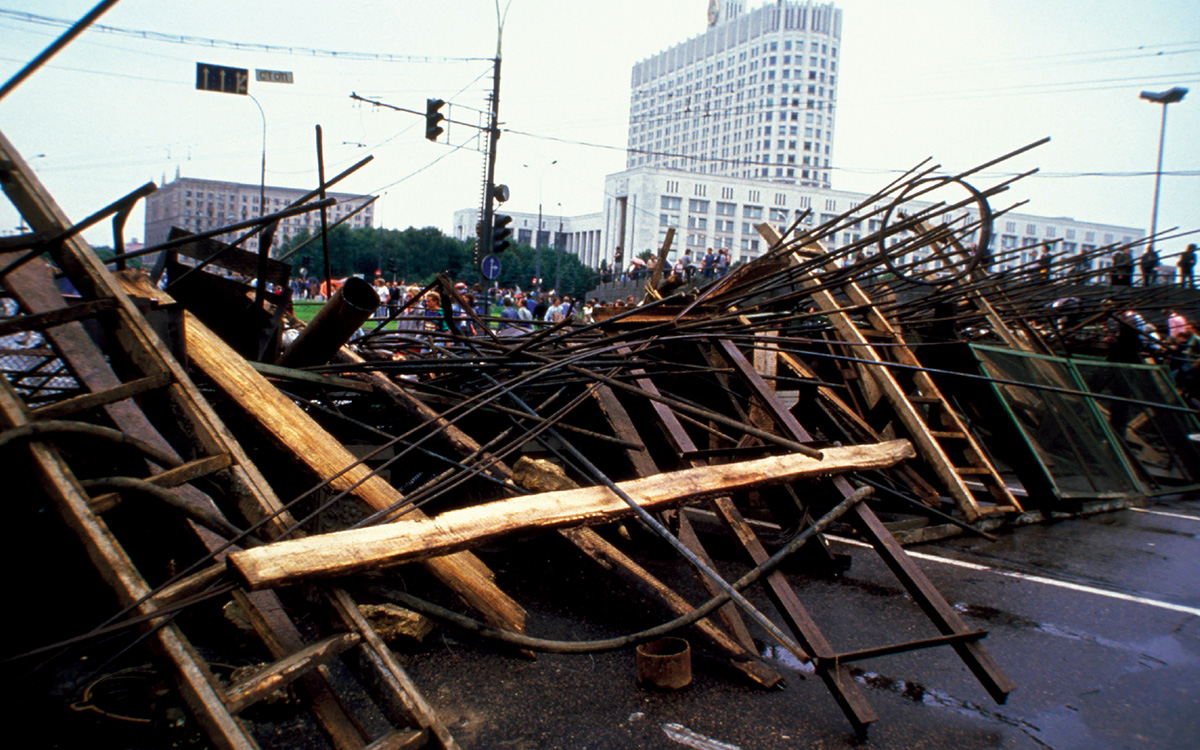
Citizen volunteers erect barricades to protect the Russian Parliament in Moscow during the 1991 coup.
Alamy
Lesson Four: Know and Explain Thyself.
I found in those early days, and subsequently, that acknowledging and explaining the flaws in my own country and society helped my credibility immensely in dealing with folks throughout society. American officials and diplomats have a well-known and regrettable penchant for preaching or talking down to people on subjects about which they consider themselves superior—like “democracy.” Don’t get me wrong—I am proud of our country and its institutions, but I recognize their flaws and that nothing human is perfect. Having grown up largely in northern New Jersey, I’ve had the opportunity to observe practically every form of political corruption known to mankind, or at least to New Jerseyans. This helped me immensely in understanding the politics of St. Petersburg and other locales, and enabled me to “talk turkey” with officials and civil society activists alike. Human nature is, after all, human nature; any diplomat would be wise to keep that in mind and act, and report, accordingly.
Lesson Five: Get Out of the Office.
As a diplomat in those days, I spent a lot of time among what Russians call the “narod”—the people, the masses—standing in lines, in crowds, shopping at local markets, and taking public transportation. I picked up quite a bit of unvarnished opinion while waiting in line, just listening and minding my own business, not to mention finding out why everyone was queueing in the first place. It was a habit I continued throughout my career, even as an ambassador, when people on the Tashkent subway or at a market in Astana would sometimes do a double take, perhaps recognizing me from some public event or news report. I’m open to just about anything that gets me out of the office, and it’s certainly better, and more fun, than attending speeches and formal meetings.
Besides, isn’t that what we’re supposed to be doing—getting out among the people? Understanding the street as well as the corridors of power? Later in my career, I found too many colleagues spent too much time planning their vacations outside the country or patronizing specialty stores for fear, it seemed, of the “foreigners” they might otherwise encounter. To understand a society and a people, I strongly believe it is necessary to experience life as they live it and not focus too much on the English-speaking elite.
Lesson Six: Learn to Listen, and Listen to Learn.
Another part of our duties in the early days after the collapse of the USSR was providing educational and English-language teaching materials to schools and libraries, as well as speaking to audiences, large and small, in the Russian language, however imperfect. I found that the library systems and the librarians themselves were the greatest proponents of education, and of openness. The librarians, all women, were without a doubt among the strongest and most resourceful people I encountered in Russia and the former Soviet republics. They found all sorts of ingenious ways to keep their underfunded libraries going. They never took no for an answer and braved even the most obstinate bureaucrat—whether in Lukashenko’s Belarus or Karimov’s Uzbekistan—to, eventually, get their way. They were mainstays of communities where economic deprivation after the fall of the USSR was rampant.
I listened to them, did my best to provide whatever assistance they requested and learned a lot from them. Their tutelage helped me greatly in dealing with the State Department’s bureaucracy. Sometimes, if not most times, it pays to listen to the people with whom we work. My experience in the former USSR led me to suggest that FSI should conduct a course in listening for diplomats.
Lesson Seven: Team Is Supreme.
After the collapse of the USSR, as we struggled to establish new embassies, we did not have the “conveniences” of established diplomatic housing, medical staff, commissaries, or even Marines and security guards. We relied on ourselves but mostly on our new local hires, who took us in almost as family. We trusted each other and built strong personal and professional bonds as colleagues, not as superiors and subordinates. Ah, how fleeting those halcyon days were—before all the department’s rules and regulations, and other agencies with their rules and regulations, arrived to separate us and complicate our lives and our work. Yes, we all knew the day would come when the “real” world would intrude on our lives and work. But, in many respects, it is often a world of our own making that hinders our diplomatic work, blinds us to essential insights and inhibits our ability to empathize.
Thirty years ago, American diplomats in the former USSR had a unique opportunity to get to know peoples and places like we never had before. We experienced the exhilaration but also the pain, uncertainty and humiliation the people around us felt, from Vladimir Putin to the babushka next door. We learned to communicate; we learned to listen (well, at least some of us did). We also learned how to explain ourselves, our country and our society, not as superiors but as people like them, journeying on a path that was hard, rocky and uncertain, but one that offered hope and something dear to which to aspire.
Living History
Back in Riga, on that fateful August day, I stood together with the leaders of the Latvian nation to witness what we all expected would be the death of a dream, and possibly of ourselves. Instead, the Soviet security forces halted their advance and never entered the parliament building. By the next day, an eerie calm had descended as news began to seep out that, back in Moscow, the coup was unraveling. I decided to travel on to Vilnius where, earlier in the year, I had stood with Lithuanians in their embattled parliament building as they suffered the onslaught of Soviet repression in their own drive for independence.
As I drove out of Riga, my car radio delivered astonishing news: The Russian Parliament had declared the Communist Party illegal, and the coup plotters were being arrested. On the road to Vilnius, I encountered a stream of military trucks filled with Soviet forces heading in the opposite direction, returning to garrison. I couldn’t believe what I was witnessing—at once terrifying and exhilarating. On that beautiful summer’s day, as I drove with the windows down through the idyllic Baltic countryside, I thought: I represent the United States of America; I can’t believe they pay me to do this.
In many respects, it is often a world of our own making that hinders our diplomatic work, blinds us to essential insights and inhibits our ability to empathize.
The experience of those years transformed me as a diplomat and as a person. It taught me a lot about the Baltic republics and Russia, and provided a foundation I continued to build on in Ukraine, Belarus, Uzbekistan and Kazakhstan. It taught me to understand these countries and their highly diversified, complex societies as they are and as they strive to be, not as we want or expect them to be. Most of all, it taught me humility and patience. It also gave me a sense of confidence in the resiliency of the human spirit and its extraordinary adaptability to change, adversity, deprivation and uncertainty. And it exposed to me an essential goodness and often greatness in people under duress.
It saddens me greatly to see, 30 years later, our consulate in St. Petersburg closed, our missions and diplomats in Russia and Belarus confined and harassed. But nothing in life is permanent.
Even in the midst of the gloom, pessimism and adversity of the dark and difficult days in the Baltics, or in Russia, Ukraine, Belarus or Uzbekistan, I was and remain heartened by the profound spirit in people to endure and hope for a better time, however long that might take.
Above all, I came to appreciate the inestimable worth of our diplomatic craft, which strives to understand, to empathize and ultimately to build, rebuild and maintain bridges. For such is our stock in trade, our vocation and our duty.
Read More...
- “Remembering 1989: Berlin Wall Stories,” by collected authors, The Foreign Service Journal, November 2019
- “In The Eye of the Storm: Team Sov,” by James Schumaker, The Foreign Service Journal, December 2011
- “The Kremlin’s Strange Victory,” by Fiona Hill, Foreign Affairs, November/December 2021

